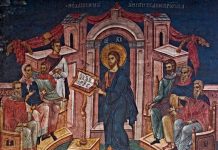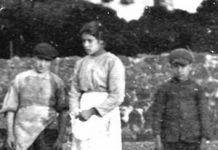“Heaven” should not be understood only in the sense that it towers above us, because this infinite space also takes the form of human interiority. Jesus compares the Kingdom of Heaven to a field of wheat to enable us to understand that something small and hidden has been sown within us which, nevertheless, has an irrepressible vital force. In spite of all obstacles, the seed will develop and the fruit will ripen. This fruit will only be good if the terrain of life is cultivated in accordance with the divine will.
For this reason in the Parable of the Weeds [tares] among the good Wheat (Mt 13:24-30). Jesus warns us that, after the owner had scattered the seed, “while men were sleeping, his enemy” intervened and sowed weeds among the wheat. This means that we must be ready to preserve the grace received from the day of our Baptism, continuing to nourish faith in the Lord that prevents evil from taking root. St Augustine commenting on the parable noted “many are at first tares but then become good grain”, and he added: “if these, when they are wicked, are not endured with patience they would not attain their praiseworthy transformation” (Quaest. septend. in Ev. sec. Matth., 12, 4: PL 35, 1371)…
Hence if we are children of such a great and good Father, let us seek to be like him! This was the aim Jesus set himself with his preaching; indeed, he said to those who were listening to him: “You… must be perfect, as your heavenly Father is perfect” (Mt 5:48). Let us turn with trust to Mary, whom we invoked yesterday with the title of Our Lady of Mount Carmel so that she may help us to follow Jesus faithfully, and so live as true children of God.
(From an Angelus address of Pope Benedict XVI in July, 2011)










